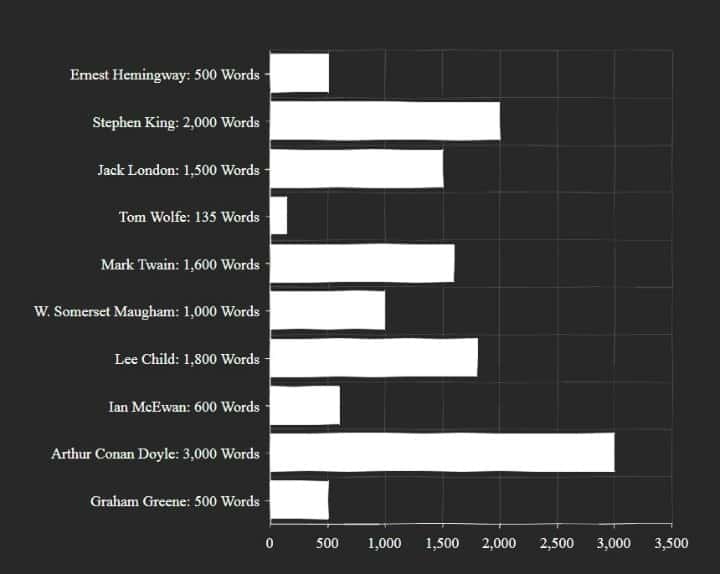
Every masterful writer, akin to an artisan, wields a unique toolkit brimming with techniques and templates.
To elevate your craft, arm yourself with a versatile repertoire of ideas, ever-ready for the taking. Sharpen these tools, and they’ll soon become instinctive allies, aiding you through countless writing challenges. Dive into our comprehensive guide of stellar writing strategies, ensuring you approach, structure, and conclude your pieces with finesse.
Here are the top writing strategies:
1. Write at the same time every day
A daily routine is essential for a productive writing life. You may have the sharpest mind and the most creative ideas, but if you don’t sit down to do your job, it won’t do you any good. If you look at the lives of creatives, you’ll see the pertinacity with which they pursue their endeavors and how they guard themselves against any interruption. Read about the daily routines of over a dozen famous writers and learn from them.
2. Use a timer for productivity and guard yourself against distractions
As Cal Newport suggested in his book Deep Work, people who can rise above distractions in the modern world have the highest chances of success. It’s difficult to stay focused when you look at three screens at the same time. Your co-workers are bothering and a phone is buzzing at you. The best tactic to fight against it is to put on your earphones with your favorite productivity music and set up a timer for 45 to 60 minutes. During this time you focus purely on writing, and nothing else. If you can pull off four sessions like this a day, you’ll be one of the most productive writers on this planet. Some writers go as far as to build separate home offices to block out distractions (see picture below).

3. Write something, write anything – just do it
The longer you wait to jump into the water from that cliff, the more scared you are. It’s the same with writing. Staring at the blank page can be intimidating. Even a seasoned pro like Stephen King said that “the scariest moment is right before you start”. Eliminate this gap between the idea and the execution. Leap into the task and you’ll see that the Muse will be on your side. You can read more about overcoming procrastination in Solving the Procrastination Puzzle which helped me get my writing routine in order.
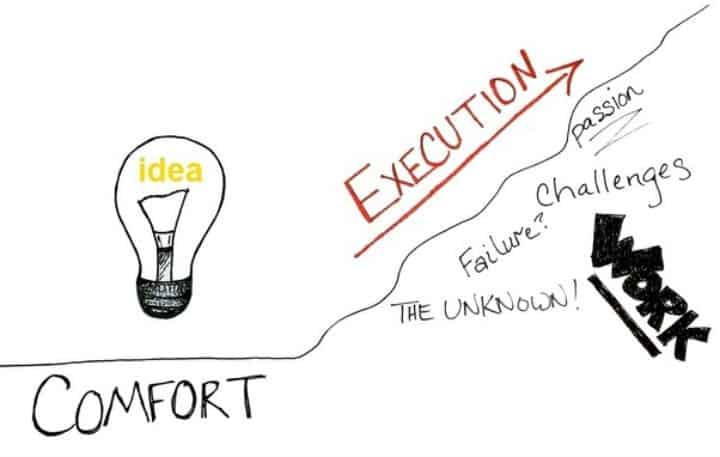
Pre-writing strategies
If you’re dealing with a more complex writing task (for example, a college essay or an academic paper), organize your material before you sit down at the keyboard. The following prewriting ideas will help you visualize your masterpiece before it comes into reality.
“One day I will find the right words, and they will be simple.” – Jack Kerouac
4. Create a quick outline for your piece of writing
- What’s your audience?
- What’s the message you’re trying to convey?
- How are you going to structure your ideas?
- In which order should you present your arguments?
- Are there any great facts and stats you can use?
Treat your outline like a scaffold that will enable you to construct the rest of your essay, article, or book. Take a few minutes to think before you start. It will save you a lot of time later.
5. Practice freewriting
Freewriting is another great strategy you can use to start writing immediately.
It goes like this:
- Think about the general idea of what you want to write about.
- Put a working title at the top of the page.
- Start writing as fast as you can. Whatever comes to mind, just write it down.
- Don’t care about grammar, punctuation, or spelling.
- Don’t try to change or edit anything. Your job is to just get words written.
It’s like with music – if you let go of inhibitions, your tunes flow smoothly. If you become rigid and think about every note, you’ll suck and stress yourself out.
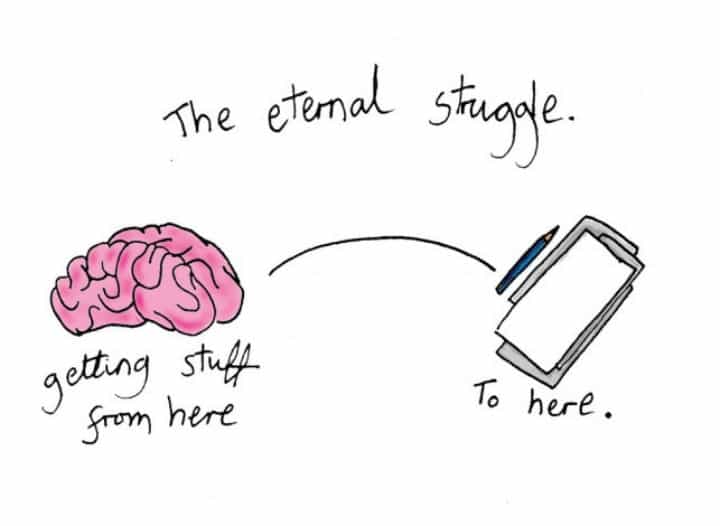
6. Create a mind map of your writing project
The idea of mind mapping was used by Leonardo da Vinci and others, but it came to the popular view because of Tony Buzan’s numerous books on the subject. By creating a mind map, you’re able to think in a non-linear manner. You can create curves, multi-layered designs, and free associations between ideas. This is lateral thinking, and it can prove indispensable for your writing projects.
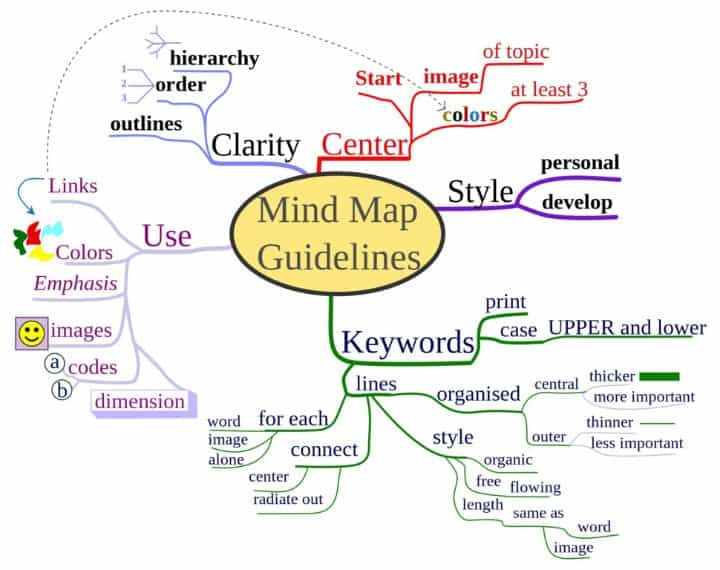
7. Do your research and take copious notes
Your writing will be judged by style but also by the number of facts, figures, statistics, and persuasive arguments you can present. Beginner writers often want to reach a certain word count to make their work look solid. But if you read through such a piece of work, you’ll soon find out that it mostly contains useless filler which doesn’t bring any value to the reader. To prevent that from happening, take good notes and do a lot of research before you slosh words on the page. You can do it with your notebook, apps like Evernote or Pocket, Pinterest boards, or other tools for pro writers. Now that you know how to discipline yourself to write and plan your work, it’s time to get down and dirty with some more tips which will add spice to your prose and make it clear, and reader-friendly.
“A writer is someone for whom writing is more difficult than it is for other people.” – Thomas Mann
8. Use simple language
Some readers delight in advanced vocabulary and deciphering hidden meanings in a piece of literature. But most people like short, punchy sentences and paragraphs because they mimic the way we communicate daily.
“One of the really bad things you can do to your writing is to dress up the vocabulary, looking for long words because you’re maybe a bit ashamed of your short ones. This is like dressing up your household pet in evening clothes.” – Stephen King
9. Have a daily writing routine and several words you want to write
This one is a biggie. Most pro writers set a daily writing quota that they need to fulfill. Writing becomes great in small increments – write a page a day and you have a book in one year. Set your daily amount based on the time you have available. 300 words is a good place to start.
10. Stop in the middle and let your subconscious mind finish the rest
Your subconscious mind is always computing and solving the problems of your conscious mind. Writers put it to work regularly to come up with creative solutions and build new worlds. You can do it by asking yourself a pressing question right before you sleep. Oftentimes, you’ll wake up with the ready answer. This has been nicely described in a book called The Committee of Sleep: How Artists, Scientists, and Athletes Use Their Dreams for Creative Problem Solving.
11. Be an architect or a gardener
Develop your approach to writing based on your personality and natural inclinations.
George R. R. Martin describes the main two types of writers in the following way:
“I think there are two types of writers, the architects and the gardeners. The architects plan everything ahead of time, like an architect building a house. They know how many rooms are going to be in the house, what kind of roof they’re going to have, where the wires are going to run, what kind of plumbing there’s going to be. They have the whole thing designed and blueprinted out before they even nail the first board up. The gardeners dig a hole, drop in a seed, and water it.”
12. Write when you feel a sudden urge to share something
On these rare occasions when the Muse is there to guide your hand, commit fully and let the prose burst out of you. Jack Kerouac wrote On The Road in three weeks, on a 120-feet long scroll of paper.
Writing like this helped him to maintain his flow, and here’s an example of what came out of it:
“[…]the only people for me are the mad ones, the ones who are mad to live, mad to talk, mad to be saved, desirous of everything at the same time, the ones who never yawn or say a commonplace thing, but burn, burn, burn like fabulous yellow roman candles exploding like spiders across the stars and in the middle you see the blue centerlight pop and everybody goes “Aw!” – Jack Kerouac
13. Mind the headlines, the titles, and the lead
80% of readers will look at your headline or the title of your piece. But only 20% of people will read the rest. David Ogilvy, the father of modern advertising, said: “On average, five times as many people read the headline as read the body copy. When you have written your headline, you have spent eighty cents out of your dollar.”
14. Edit your writing ruthlessly
In “On Writing Well”, a classic in the writing advice genre, Will Zinsser admonishes aspiring authors to cut out all the unnecessary baggage from their drafts. If you’re in love with your introduction but ultimately, it doesn’t fit into the overall piece, remove it (or as Stephen King says – “kill your darlings”). The same goes for sentences. If they’re too long or unintelligible, reduce them until they become crystal clear.
15. Use a conversational style
Some writers like to use pompous language because it bolsters their egos. But the “write as you speak” idea is always a better tactic. Remember that the authors who sell millions of books are excellent storytellers, not lecturers. After you write something, you can read it out loud to see how it “reads”. Then you can fix any bumps on the road.
16. Write to someone (your ideal target audience)
One of the biggest mistakes a writer can make is to write to an undefined mass audience. This makes the piece impersonal and uninteresting. Your article, book, or ad copy will always be seen by a single pair of eyeballs at a time. So write to a single person – maybe it’s your friend, or maybe it’s an imagined persona you want to address.
17. Communicate clearly
Heed the advice from the classic The Elements of Style and omit needless words: Vigorous writing is concise. A sentence should contain no unnecessary words, and a paragraph no unnecessary sentences, for the same reason that a drawing should have no unnecessary lines and a machine no unnecessary parts. This requires not that the writer make all his sentences short, or that he avoid all detail and treat his subjects only in outline, but that every word tell.” – William Strunk Jr.
18. Read amazing books that will turn you into a better writer
Books are the oxygen with which the writer breathes. They’ll help you develop your style faster than anything else. When you look at the workspaces of famous authors, you’ll see that usually they’re surrounded by shelves of books. That’s where they get their inspiration. By reading great works, as well as the best books on writing, you unconsciously borrow some of this greatness and transfer it into your work.
“Let others pride themselves on how many pages they have written; I’d rather boast about the ones I’ve read.” – Jorge Luis Borges
19. Get straight to the point
In journalism, there’s the technique of Inverted Pyramid. It says that when writing (especially for the web or a newspaper) you should “front-load” all the relevant information. You provide the crucial information at the very top and then describe the event or the story in more detail. This works great if you write for readers with short attention spans, and quickly give them the info they need.
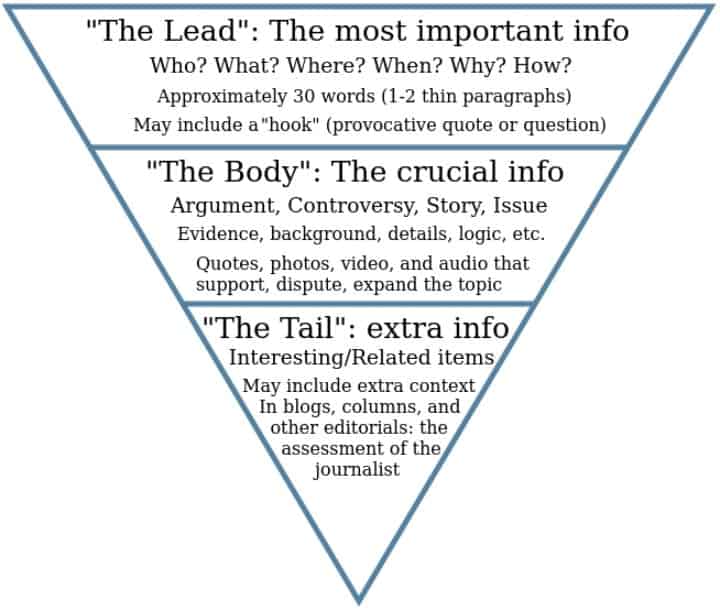
20. Try to improve with each new piece of writing
Kaizen is the Japanese art of continuous and never-ending improvement. This concept can easily be applied to your day-to-day writing activities. Accept that becoming great is going to take time, but, try to be better with every piece you write. This attitude of patience is healthy and will enable you to push through difficulties.
21. Back your claims with research and statistics
Good expository writing is always densely packed with data, references to other works, and interesting statistics. Some books contain hundreds of references to back up the arguments. This adds more weight to your work and makes it more convincing.
Conclusion and extra resources
Along with this article, you can also consult some relevant books on the subject.
If you want to help to develop the writing skills of your students:
- The Writing Strategies Book: Your Everything Guide to Developing Skilled Writers by Jennifer Serravallo by Patty McGee
- Feedback That Moves Writers Forward: How to Escape Correcting Mode to Transform Student Writing by Patty McGee
- The Writing Teacher’s Companion: Embracing Choice, Voice, Purpose & Play by Ralph Fletcher
If you want to develop your skills:
- Writing Tools: 55 Essential Strategies for Every Writer by Roy Peter Clark
- You can also check my guide on how to write well.
Hey there, welcome to my blog! I'm a full-time entrepreneur building two companies, a digital marketer, and a content creator with 10+ years of experience. I started RafalReyzer.com to provide you with great tools and strategies you can use to become a proficient digital marketer and achieve freedom through online creativity. My site is a one-stop shop for digital marketers, and content enthusiasts who want to be independent, earn more money, and create beautiful things. Explore my journey here, and don't forget to get in touch if you need help with digital marketing.


